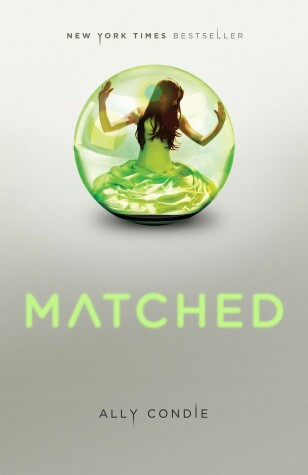Reviewed by Jo on
When I first heard about this book, I was so intrigued! A book where the government chooses who you spend the rest of your life with?! This has got to be worth reading! Now I'm finished, I have to say, I was pretty disappointed.
The plot is pretty fascinating; a world set way in the future, where everyone is governed by probability and statistics. They live a way an "optimal" life as worked out by Society. They are Matched with the optimal partner, to produce optimal, healthy offspring. They eat what Society has found to give them the optimal nutrients to keep them healthy - regardless of taste. They are given the job they will do best at - the possibility of them may not liking it doesn't come into it. They die when Society states they've lived an optimal life, and it's probable that they will deteriorate and have a less than optimal life from that time onwards. The perfect life, right? Where everyone has what's best for them, live the best life they can? No!
There is no free will. It seems like there is, but there isn't. How they spend their free recreation hours on a Saturday evening is up to them - as long as it's either games, a showing, or going to the music hall. They get to have a free summer activity which they can choose - but involves them doing work. Society declared their culture was too cluttered, so everything was sorted, so there are now the Hundred Songs, the Hundred Paintings, the Hundred Poems, etc. Everything is controlled. Everything is worked out. Society considers all possible factors, and predicts the probability of even everyone's reactions to different events, their behaviour, and the type of person they will be. It's Big Brother gone mad.
This book is all about fighting, striving for change, for the right to choice and free will. What I liked most was the power that words held for Cassia. During his Death Banquet, Cassias grandfather gives her paper with two poems on them. Grandfather's own Grandmother was one of the people who were called to sort out the poetry and narrow it down to just the Hundred Poems. She stole some, and handed them down. These poems hold such importance for Cassia; not just because they are forbidden, but because of what they tell you - to fight. Society has also forbidden writing, so no-one ever learns how to write. They have their Scribes, where they can type, but they can't write with their hands. Ky, one of the guys who lives in her borough, can. And he teaches her. First, Cassia learns to write her name, and it's such a powerful moment, of almost ownership - she can write her own name. All these acts of rebellion - forbidden writing, forbidden poems, rebellion actually in the poem, and eventually, forbidden love - spark something inside Cassia. It's great to see her change from someone who believes in the Society, and that it keeps them safe, that they all live good lives, to someone who questions everything she knows.
However, apart from Ky, I didn't find the characters believable. They were two dimensional as opposed to three dimensional. I didn't feel anything for them, because there wasn't enough to make me feel. I was indifferent to everyone except Ky. I think this was also because of the pace. It's not fast or slow, it's average. And there's no real suspense. It all seems to be chugging along on on flat level. No rollercoaster in this book. At the beginning, I was intrigued, but then, until things started to develop with Ky, and we learned more about him, and the importance of words, I just wasn't interested, and, to be frank, bored. I read on because I can't start a book and not finish it. I just can't do it. But if I did, I would have stopped reading. I also think I've discovered that dystopian novels aren't really my thing. There may be a few dystopian novels that I like, but as a genre, I don't think it's my cup of tea.
I must say, it is the kind of book I think will make an amazing movie, so I'm really glad there will be a chance to see it on the big screen!
However, there is a lot about this novel that fans of dystopian will love. The way people are governed, the technology, the sheer wrongness of it all that makes a dystopian. I'm sure there are a lot of people who will - and who have - loved this book. I suggest you check out some other reviews of Matched (see below) before you decide just by my review. Matched could have turned out to be such an amazing boook, it had a lot of promise, it just unfortunately fell flat for me.
From Once Upon a Bookcase - YA book blog
Reading updates
- Started reading
- Finished reading
- 16 October, 2010: Reviewed
